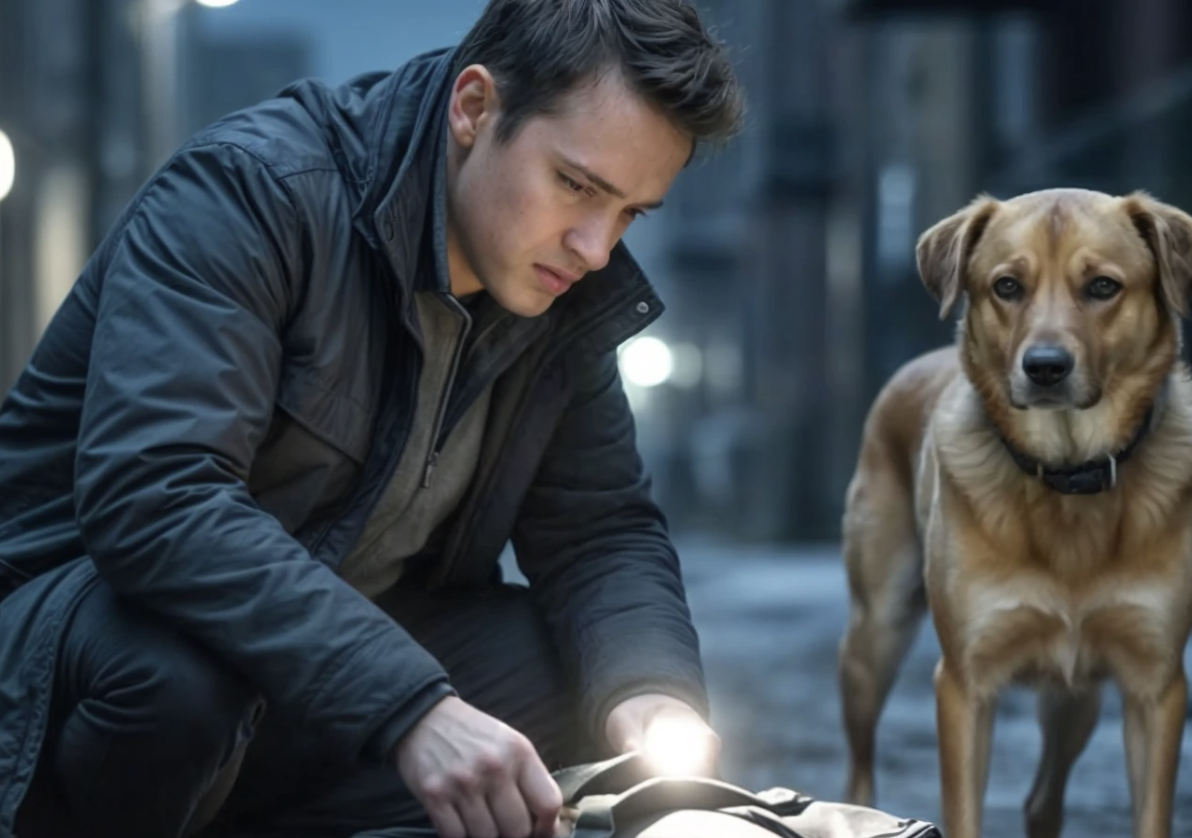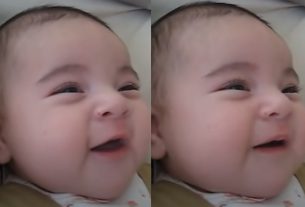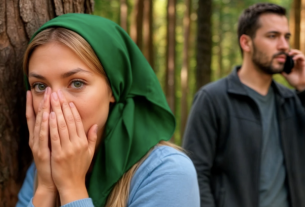A gray city evening was settling over the streets, blurring the outlines of buildings and filling the air with damp chill. The streetlights were coming on one by one, casting long, trembling shadows across the wet asphalt. It was at that hour, hurrying home with his head full of tired thoughts, that LEONID saw her for the first time.
He was taking the shortcut through an old alley where time seemed to have frozen between brick walls, cracked and covered with faded graffiti. And there, by a dark entranceway, next to a garbage container, she was sitting.
A small dog with fur the color of withered autumn leaves.
She wasn’t rushing around, wasn’t searching for food — she simply sat there as if rooted to the spot, ears flattened, her tense gaze fixed on some empty point in front of her. A passerby, swallowed up by their own worries, would hardly have spared her a glance. But something in her posture, in that mute, motionless loyalty to this place, caught Leonid’s eye and made him stop for a moment.
He slowed down, feeling an inexplicable stab of anxiety somewhere deep inside, but then, brushing the feeling away like a bothersome gnat, he walked on, toward the warmth of his home, the familiar comfort, leaving behind the lonely little figure in the gathering dusk.
The next day, coming back the same way, he saw her again. The weather had finally turned bad; a fine, nagging drizzle was sifting endlessly from the sky, turning the alley into something like a cold, clammy tunnel. And again, she was at her post.
This time Leonid got a better look at her. She was thin, her ribs showing under the wet fur — but that wasn’t what struck him most. Beside her lay a dark, completely soaked garbage bag, shapeless and filthy. And the dog wasn’t just sitting next to it — she was guarding it.
From time to time she would get up, circle her burden in a slow, unsteady loop, then lie back down on the ground, never taking her eyes off the bag. Her devotion was frightening in its absolute, reckless intensity.
When Leonid tried to come closer, she neither growled nor jumped away. She only raised her head, and their eyes met. There was no pleading in them, no aggression. Only a question — heavy and soundless — hanging in the damp air between them.
Leonid froze, feeling goosebumps run up his back. He didn’t know what to do. His thoughts were tangled; the worst possible guesses were forming in his mind.
“What have you got there?” he whispered softly, mostly to himself.
In response, the dog only hunched her head down into her shoulders, but she did not look away. That silent dialogue lasted perhaps a minute, or perhaps an eternity. Then, with a sudden twitch, as if coming to her senses, she darted back into the shadow of the entrance and went still, merging with the darkness.
Leonid was left alone in the middle of the alley, under the cold rain, with a stone in his chest. He still didn’t dare go up to that black bag.
What if there was something horrible inside?
What if it was what he was now thinking of with a soul-freezing fear?
He turned and almost ran away, muttering excuses under his breath that brought no relief.
“Not my business. Everyone has their own problems. Someone else will deal with it.”
But that night became endless for him. He tossed and turned in bed, and behind his closed eyes the same image rose again and again — the dog, the bag, the mute question in her eyes.
It wasn’t just the image of a stray animal; it was an entire story, a tragedy playing out a few steps from his familiar, comfortable life. He felt like a coward, a traitor, a man who had walked past someone else’s misfortune simply because he was afraid to look it in the face.
The next morning he could barely concentrate at work. The numbers in the reports blurred, his colleagues talked to him, and all he heard was the distant echo of their words. All of him was back there, in that filthy alley under the cold autumn rain.
And then the third evening came.
Leonid no longer argued with himself. He left the office with a firm resolve. He wasn’t just walking home; he was going to a meeting he feared, but could no longer postpone. In the pocket of his jacket lay a small but powerful flashlight.
The sky was crying again, and the city was drowning in a gray, wet veil. The alley met him with a deathly silence. Everything was in its place: the trash cans, the puddles — and her.
She sat hunched, barely moving, as if her strength was at an end. The same bag lay beside her, dark and silent. Leonid walked up slowly, his heart thudding in his throat. He crouched down, trying not to make any sudden moves.
“Hey, girl,” he said softly, his voice sounding hoarse and strange in the stillness. “What are you guarding here? Let’s have a look.”
He pointed the flashlight beam at the wet plastic. The bag was tied with a tight, soggy knot. Leonid’s hands trembled slightly. Everything inside him was screaming for him to stop, turn around and leave. But he couldn’t.
He saw the dog’s eyes following his every movement. There was no threat in them, only a deep, bottomless exhaustion and that same hope he was afraid to see.
He grabbed the knot. His fingers slipped, the cord wouldn’t give. Again and again he tugged at it, feeling his nails bend and pack with grime. At last the knot gave way with a soft snap.
And in that instant, barely audible, from deep inside the bag came a sound. Thin, weak, like the squeak of a newly hatched chick.
Leonid froze, the blood draining from his face. He tore the plastic open sharply, almost roughly, and directed the light inside.
There, at the bottom of the wet bag, huddled into one living, trembling lump, lay two tiny puppies. They were blind, their fur damp and smeared with dirt — but they were alive. Their tiny bodies rose and fell ever so slightly with each breath.
With his heart in his throat, Leonid carefully reached in and picked one up. It fit in the palm of his hand — so fragile and defenseless. Then he took out the second one as well, pressing them both to his chest under his jacket, trying to warm them with his own body. He could feel their tiny hearts beating in time with his own, which was hammering wildly.
And then he heard a quiet, strangled sound behind him. Not a bark, not a growl. A short, broken “woof,” more like a sigh of relief.
He turned around slowly.
The reddish dog was standing a couple of steps away from him. She didn’t lunge, didn’t try to take the puppies back. She just looked at him.
And in her eyes Leonid read everything. All the horror of the past days, all the soul-draining fatigue, all the maternal fear and — the thing that made his heart clench — boundless, overwhelming gratitude.
He suddenly understood with absolute clarity: he hadn’t come here to be a savior. It was she, this homeless, exhausted dog, who had spent three days waiting, hoping and believing that someone would appear in whom a human being would wake up. Someone who wouldn’t walk past.
“It’s all right,” he said quietly, his voice shaking. “It’s over. Come with me.”
He walked home, carrying the two rescued babies under his jacket. She followed, keeping a small distance, but no longer hiding, no longer slipping into the shadows. Her tail hung low, but there was something new in her gait — a wary, tentative confidence.
In his small but cozy apartment, Leonid made a nest of old towels in the warmest room and carefully laid the puppies there, feeding them warm milk from a dropper. Their mother lay down beside them, stretching her head out on her paws, and her gaze was no longer tense. It had become calm, deep, full of trust.
Only then did her tail gently, almost inaudibly, tap against the floor, as if asking permission to stay.
Leonid named the puppies Spark and Joy. And he called their mother Hope.
Because that evening, on the wet asphalt, he had found not just three homeless creatures. He had found that very hope that flickers even in the darkest corners of the city, that spark of life that doesn’t go out under pouring rain, and that simple happiness that fits in the palm of your hand.
And when late at night, in the silence broken only by the steady breathing of the sleeping dogs, he looked at them, he understood: the most important thing you ever find in life is not something, but someone.
And now his home was filled not just with pets, but with a living, gentle light they had brought with them — a light that melted the ice of urban loneliness and gave his home back its soul.



